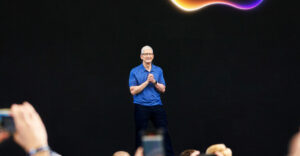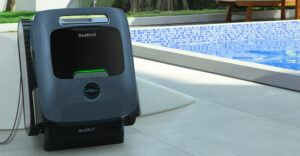
There are two mistakes a vendor can make that it may not be able to recover from. One is to build too many products, which stay in inventory and prevent future sales; and the other is to have too few products and lose out of sales as a result.
Nintendo did the latter, and that will be a problem for the company in 2008. With CES and Macworld starting, let’s chat about how Apple can beat CES (and then we’ll see if it does) and focus on the lessons Apple teaches that few seem to be actually learning. We had the big battle between HD DVD and Blu-ray and one needed a decisive win. Let’s discuss what is next.
Finally let’s look at my product of the week — a product that can allow you to put the Blu-ray vs. HD DVD battle behind you.
Nintendo Screws Up
It was clear that the Wii was going to be the hot product for the fourth quarter, and as we entered the holiday buying season, it was selling at a significant premium. Game systems are based on the razor/blade model in that the vendors subsidize the game console to get an annuity of game royalties, which is where they derive their profits.
The Wii subsidy is believed to be — when compared to Sony — almost insignificant, so Nintendo should have been able to sell millions. Due to manufacturing shortages, it didn’t even sell 1 million units.
Anecdotal data suggests that Sony may, in terms of sell-through, have benefited more from this than Microsoft did — probably because the Sony PS3 was seen as newer and more exclusive.
Whenever your most focused competitor gains because you screwed up, it isn’t a good thing, and Nintendo doesn’t have the scale of either Sony or Microsoft to bury this kind of a mistake in revenue from other units.
This was a classic miss and, based on demand, Nintendo lost between 60 and 75 percent of the available business, most of which will likely not return because kids want something during the holidays — and IOUs just don’t cut it.
The Nintendo DS System actually outsold both the hotter Wii and the Sony’s PSP because it was not constrained. Apparently, it also outsold both the Xbox and PS3 as well (once again pointing out that $200 is the magic break point for high volumes, and the lower you get, the faster sales volume comes up).
Had Nintendo been able to meet demand, it would have ended the year so far ahead of the other players that it could have dominated the console and handheld game player market. However, by missing, everyone stays in the game. This is going to hurt in 2008 as the other folks bring their prices in line with the market.
How Apple Wins Against CES
Speaking of major market moves, as I’ve mentioned before, Apple schooled the CES vendors last year and it amazes me how many didn’t seem to learn the lesson. This year, a large number of vendors are asking whether CES even makes sense anymore as a result.
It isn’t a resource problem that is at issue, it is the amount of noise that CES generates and how easily Apple rises above it by not being there. If it makes more sense for most to not be at CES, why should they go in 2009?
CES has a lot of wonderful products — the last big one was the Motorola Razr. That product both got excitement similar to the iPhone and ended up in more people’s hands because it was vastly more affordable, reliable and portable — though it was much harder to use.
Few remember, however, that the Razr didn’t run against an Apple offering, it was a surprise hit even to Motorola, and while it stayed at the top of the sales volume chart for longer than any phone I can remember, Motorola wasn’t able to follow it up with another success and suffered badly in 2007 as a result.
Apple wins by keeping it simple. Just a few products to talk about and typically only one that is the star that allows folks to focus on and talk about it. CES is crammed full of offerings, many of which are absolute crap, and the great products get drowned out by the noise and confusion.
While Apple focuses on the benefits its products offer, the CES vendors generally focus on technologies and features, making their offerings seem to be in search of customers who see them as too complex and confusing to understand.
There is a contest for the best products at CES, but the winners aren’t particularly visible, and even those of us who have been judges are left out of the notification process.
In many ways, this showcases what Apple does well. It generally releases complete products, not offerings the consumer has to finish; it focuses heavily on the out-of-box experience; it sells the benefits, not the features or technology; and it focuses on just a couple things at a time, avoiding the shotgun launches that involve vendors throwing out tons of stuff hoping one or more will actually be successful.
So, to be successful, the lesson Apple teaches is to focus, sell the benefits, complete the offering, and announce at a time and place where you won’t get drowned out by the noise. This isn’t rocket science, but — you watch — the number of people who get this right other than Apple will likely be a very small number (possibly even zero). Oh, and they name their products with names folks can remember — seriously, who can remember XR37TRW as a product name?
High-Def DVD: War Update
The HD DVD side sold more stand-alone systems, the Blu-ray side (partially thanks to Wii shortages) made up for this with PS3 sales, and the winner is — drumroll please: The up-converting DVD player. One side needed to win decisively over the holiday season, both sides exit the year claiming victory and this means both sides lost.
If, as rumored, Apple refreshes the Apple TV product and gets rentals working, they could actually outsell both HD optical disk offerings in 2008 making both Sony and Toshiba look stupid.
The problem with the Apple TV wasn’t user experience, it was content and lack of marketing (which probably was because Jobs himself knew the device sucked without the needed content). Looks like Apple is fixing the content problem, Cisco is expected to have an offering on the market that may outdo Apple’s later in the year, Microsoft improved offerings on a number of platforms, and even Digeo is expected to go after this segment this year (Digeo is a Paul Allen company).
In fact — watch — at CES and Macworld, much of the consistent buzz will likely be on these set-top boxes and not on the high definition optical players.
Product of the Week: Addonics Zebra HD Combo Drive
Having said that, I personally got off the HD DVD vs. Blu-ray merry-go-round and picked up an Addonics Zebra $440 Blu-ray/HD DVD dual mode USB/SATA optical drive — and it works great. Addonics is a little company located in Silicon Valley, which meant I could drive over and pick it up.
It comes with drivers for Windows (Vista is best), the Mac OS and Linux, but it only has player software for Windows so you’ll need to run down a player if you want to run this on a Linux or Apple PC. It’s based around the LG dual-mode drive, which should be very reliable as well, making me wonder which PC maker will put this drive in a desktop PC first.
While I typically prefer the Corel InterVideo WinDVD player better, it didn’t support my hardware configuration and the CyberLink Hi-Def Suite that shipped with the product worked well, though it was probably a little geeky for most. The hardware was solid though, and the driver support side has seamlessly updated the hardware twice since I installed it, suggesting you’ll be able to eventually pick the player you want to get this to work.
Given that it is USB-based, there is a chance someone will figure out how to get this to work with an Xbox 360 or Home Media Server (wouldn’t that be interesting?) or an Apple TV (and it will work with a Mac Mini, which many quietly use as a media server). This is the first affordable dual-mode solution I’ve seen personally and I’m impressed with it, so it is my product of the week.
Rob Enderle is a TechNewsWorld columnist and the principal analyst for the Enderle Group, a consultancy that focuses on personal technology products and trends.





















































